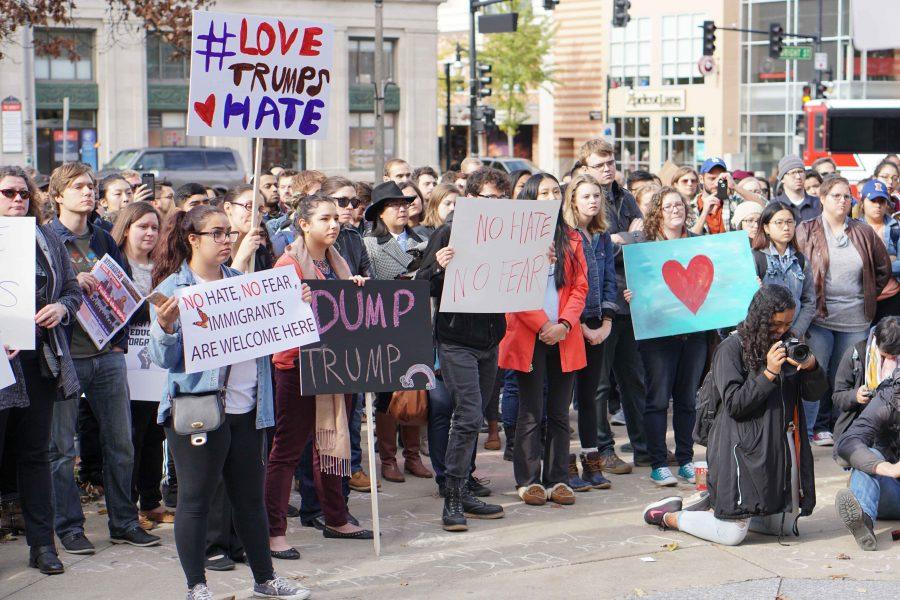Students, professors oppose Trump’s immigration ban sign petition
The Not My President Solidarity Rally was hosted by the Mexican Student Association at UIUC. Many students protested the discriminatory attitudes towards undocumented individuals during the presidential election.
January 28, 2017
One University of Illinois at Chicago student was unsure whether to stay in the United States after his finished his Ph.D. in two years, but he made his decision Friday. Mohsen Aliabadi, originally from Iran, wants to leave.
“The situation has become worse here, for sure,” Aliabadi said. “I don’t want to stay here. I have to consider other countries, other schools in other countries.”
Aliabadi signed a petition along with thousands of academics reaching 7,144 signatures at the time of publication, including 115 from the University system, denouncing President Trump’s temporary ban on people from Iran, Iraq, Libya, Somalia, Sudan, Syria and Yemen entering the U.S.
Trump signed the executive order, which he said aims to prevent radical Islamic terrorists from entering the country, Friday. The move bars people from the seven countries from entering the U.S. for 30 days, halts the refugee program for 120 days and suspends indefinitely Syrian refugees from entering the country.
Proponents said the executive order is a way to keep Americans safe until new vetting procedures are established, while opponents have criticized it as discriminatory.
Get The Daily Illini in your inbox!
The petition, titled “Academics Against Immigration Executive Order,” accuses the executive order of being “discriminatory,” “detrimental to national interests” and posing an “undue burden on members” of the academic community.
At the University, there are 133 students from Iran, two from Iraq, three from Libya, one from Sudan, four from Syria, one from Yemen and zero from Somalia, the seven countries included in the executive order.
Hadi Esfahani, economics and business administration professor, moved to the U.S. from Iran in 1978. He understands the desire to prevent terrorists from entering the country, but does not understand why Iran is on the list, since an Iranian has never committed an act of terrorism in the U.S.
He said he worries the ban targets Muslims.
“For a lot of Muslims in the community, it reminds them of the way Jews were initially branded in Germany,” he said.
Some professors who signed the petition fear the executive order will destroy the U.S. higher education’s image abroad.
Dan Roth, computer science professor, came to the U.S. from Israel in 1990 to pursue a PhD at Harvard University. He said that some international students will not apply to American universities because of the executive order.
“It’s a clear signal because the issue not only that they are banned from coming for the first time, it impacts the way international students can travel,” Roth said. “If they go to a conference, they may get stuck. If they go home, they may go stuck and may not be able to come back. And it impacts the way they think about the U.S.”
Charles Ledford, assistant professor of journalism, signed the petition because he thinks it is “discriminatory” and “immoral.” He thinks the ban hurts the United States’ international appearance.
“It poisons our relationship, not even so much with countries, it poisons relationship with people, individuals in those countries,” he said. “It’s not in America’s interest.”
David Ceperly, physics professor, said signing the petition was a “no brainer.” He hopes signing the petition shows international students the University’s faculty supports them.
“(The executive order) goes against everything our country is for,” he said. “We’re supposed to be a nation of immigrants. And I feel with our graduate and undergraduate students, so many are from other countries, that no, they add to our country, they’re not dangers to our country.”
Sergei Maslov, bioengineering professor, thinks the petition will likely not force the president to reverse course.
He hopes it sends a message to international students that professors at the University do not agree with the executive order.
Spokespeople for the University did not respond to The Daily Illini’s email requests for comment.
Chancellor Robert Jones emailed faculty Sunday afternoon, saying the University is crafting a statement to reassure those from affected countries that the University is monitoring the situation and advocating on their behalf, recommending against any international travel and providing contact numbers for assistance at each campus.
In the email, Jones said Associate Chancellor and University spokeswoman Robin Kaler “will serve as the point of contact for reporting specific cases where our students, faculty, staff postdocs or visiting scholars have been detained or otherwise experienced difficulties because of the new executive order.”
Jones also wrote Vice Provost Abbas Benmamoun will chair an Administrative Working Group on Immigration. It will include members from offices around campus to stay updated with policy changes affecting the international student population.







